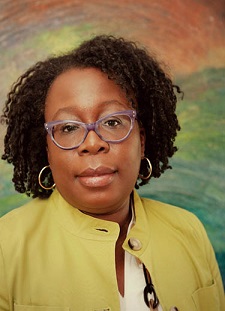
Hayley Thompson, Ph.D., associate professor of Oncology for the Wayne State University School of Medicine and leader of the Population Studies and Disparities Research Program for the Barbara Ann Karmanos Cancer Institute, has spent her career addressing health disparities and collaborating with community groups and others to find solutions to improve health outcomes for those most vulnerable. Dr. Thompson launched the Detroit HealthLink for Equity in Cancer Care in 2016 and most recently expanded the program to engage LGBTQ communities in Detroit to help close the gaps on cancer disparities.
Dr. Thompson received a two-year engagement award of $250,000 from the Eugene Washington Patient-Centered Outcomes Research Institute for her grant submission (2971) titled, "Partnering with Sexual and Gender Minority Communities to Address Cancer Disparities in Detroit." Working closely with LGBT Detroit - an African-American-led grassroots organization - Wayne State University, Michigan State University, with consulting by SAGE Metro Detroit (Services & Advocacy for LGBT Elders), the program engages sexual and gender minorities, or SGMs, living with cancer as well as their caregivers and invites them to share their voice related to their cancer experience for the purpose of gaining a greater understanding of the delivery of care, identifying where improvements can be made, and expanding collaborations and stakeholders for future research collaborations.
"There is emerging evidence that sexual and gender minorities are disproportionately burdened by cancer," Dr. Thompson said. "This partnership and project to build Cancer Action Councils in LGBTQ communities is a crucial step in addressing cancer disparities in screening rates, age of diagnosis and quality of life for survivors in SGM communities. Cancer Action Council members will develop research priorities, implement research and obtain data that can move health policy forward, improving the lives of LGBTQ community members impacted by cancer."
The objectives of Detroit HealthLink with the LGBTQ community are to:
Establish two SGM Cancer Action Councils with community stakeholder members,
Train at least 20 members using an existing curriculum to increase their capacity to serve as Patient-Centered Outcomes Research partners,
Identify cancer-specific PCOR needs among racially and socioeconomically diverse SGM adults through focus groups,
Develop a report of cancer-specific research priorities generated by the SGM Cancer Action Councils and informed by the data collected from the focus groups, and
Create a network of cancer researchers interested in SGM PCOR to whom these research priorities will be disseminated.
Curtis Lipscomb, executive director of LGBT Detroit, sees this engagement as a critical opportunity to help improve awareness, understanding and cancer information related to the LGBTQ community.
"The most important thing about Detroit HealthLink and the LGBTQ Cancer Action Councils is that people impacted by cancer who identify as LGBTQ have a unique opportunity to engage with cancer specialists.
"Only in the state of Michigan does this opportunity exist, which allows us to share intimate experiences with people who can help us and others like us, therefore reducing hardship and stress to this ever-increasing problem," Lipscomb said.
Individuals interested in learning more about the LGBTQ Cancer Action Councils and Detroit HealthLink may visit here or call 313-576-9691.
"Partnering with Sexual and Gender Minority Communities to Address Cancer Disparities in Detroit" is among a portfolio of projects that PCORI has funded to help develop a community of patients and other health care stakeholders who have the knowledge, skills and partnerships to participate in and advance patient-centered outcomes research and patient-centered comparative effectiveness research.
"Karmanos Cancer Institute's LGBTQ HealthLink project was selected for PCORI Engagement Award funding for its commitment to improving the capacity for patients and other stakeholders to engage in patient-centered research and its potential to increase the usefulness and trustworthiness of the research PCORI funds," said Jean Slutsky, PCORI's chief engagement and dissemination officer. "We look forward to following the project's progress and working with Karmanos Cancer Institute and Wayne State University to share the results."
Dr. Thompson's submission project and the other projects approved for funding by the PCORI Engagement Award Program were selected through a highly competitive review process in which applications were assessed for their ability to meet PCORI's engagement goals and objectives, as well as program criteria.
For more information about PCORI's funding to support engagement efforts, visit http://www.pcori.org/content/eugene-washington-pcori-engagement-awards/.